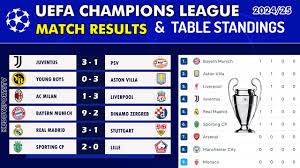How the New Champions League Format Works: A Comprehensive Overview
The UEFA Champions League, Europe’s premier club football competition, has undergone a significant overhaul in its format for the 2024-2025 season, marking a new era in European club football. The changes come as part of UEFA’s efforts to make the competition more competitive, financially lucrative, and globally appealing. While the competition still retains its iconic knockout rounds and prestigious final, the revamped format introduces a series of important modifications designed to increase the number of matches and provide more opportunities for clubs to compete at the highest level. This article explores how the new Champions League format works and the potential impact of these changes on the competition.
One of the most significant alterations to the Champions League format is the introduction of a "Swiss model" group stage. Unlike the previous system, where 32 teams were divided into eight groups of four, the new format features a single league of 36 teams. Each club will play eight matches in a round-robin format, facing different opponents, with four of those matches at home and four away. This system removes the traditional group stages and instead allows teams to compete in a more flexible, league-style format, where they face a wider variety of clubs. The teams are then ranked based on their performance, with the top eight automatically qualifying for the knockout rounds, while the teams finishing 9th to 24th enter a play-off round to determine who advances to the Round of 16. This new approach ensures that each team plays more matches against a diverse range of opposition, which enhances the competitive nature of the tournament.
The new format also sees an expansion of the tournament’s overall structure, with more teams involved and a greater number of matches played. The Champions League will now feature 36 teams, up from the previous 32, meaning that clubs from smaller leagues and those with lower coefficients will have more opportunities to qualify for the tournament. Additionally, the increased number of games means more revenue for UEFA and participating clubs, as well as more exposure for sponsors and broadcasters. While this expansion may lead to concerns about the dilution of competition, UEFA has emphasized that the changes aim to provide better balance and fairness, ensuring that the best teams have the chance to progress through the stages while offering lesser-known clubs more chances to compete at the highest level.
Another key change introduced is the elimination of the "third place" finishers from the group stage automatically dropping into the Europa League. Under the new format, all teams that finish outside the top eight after the round-robin phase will enter a play-off round to fight for a spot in the knockout stage. This means that there will be no easy paths for clubs that finish in lower positions, creating a more intense and unpredictable environment throughout the competition. The new system also allows for more direct qualification through domestic league performance, with the top clubs from the major leagues guaranteed a place in the competition, further promoting the concept of merit-based entry.
While the changes bring exciting opportunities for clubs and fans alike, they also raise questions about the future of Europe’s top-tier competitions. The new format is expected to create more thrilling matchups, with elite teams playing each other more frequently, leading to greater excitement and drama. However, some critics argue that the increased number of games could lead to player fatigue and potentially disrupt domestic leagues and cup competitions. Furthermore, the expansion of the Champions League could lead to a concentration of power among the wealthier clubs, potentially undermining the tournament's original ethos of fair competition. As the new system takes effect, only time will tell how these changes impact the Champions League's legacy and its role in shaping European football for years to come.
In conclusion, the revamped Champions League format represents a bold and ambitious shift in European club football. By introducing the Swiss model, expanding the number of teams, and changing the qualification structure, UEFA aims to create a more competitive and financially rewarding tournament. However, the success of these changes will depend on how well the new system balances the needs of all clubs, from the biggest giants to the smaller teams, ensuring that the Champions League remains the pinnacle of European football for the future.



No comments yet
Be the first to share your thoughts!